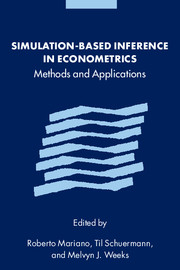Book contents
- Frontmatter
- Contents
- List of contributors
- Foreword by M. Hashem Pesaran
- Part I Simulation-based inference in econometrics: methods and applications
- Part II Microeconometric methods
- Introduction
- 2 Accelerated Monte Carlo integration: an application to dynamic latent variables models
- 3 Some practical issues in maximum simulated likelihood
- 4 Bayesian inference for dynamic discrete choice models without the need for dynamic programming
- 5 Testing binomial and multinomial choice models using Cox's non-nested test
- 6 Bayesian analysis of the multinomial probit model
- Part III Time series methods and models
- Part IV Other areas of application and technical issues
- Index
6 - Bayesian analysis of the multinomial probit model
Published online by Cambridge University Press: 04 August 2010
- Frontmatter
- Contents
- List of contributors
- Foreword by M. Hashem Pesaran
- Part I Simulation-based inference in econometrics: methods and applications
- Part II Microeconometric methods
- Introduction
- 2 Accelerated Monte Carlo integration: an application to dynamic latent variables models
- 3 Some practical issues in maximum simulated likelihood
- 4 Bayesian inference for dynamic discrete choice models without the need for dynamic programming
- 5 Testing binomial and multinomial choice models using Cox's non-nested test
- 6 Bayesian analysis of the multinomial probit model
- Part III Time series methods and models
- Part IV Other areas of application and technical issues
- Index
Summary
Introduction
In this chapter, we discuss Bayesian analysis of the multinomial probit model (MNP) using Markov chain Monte Carlo methods. Although the MNP model has been in the econometrics and psychology literature for some 60 years, it is only recently that estimation and inference methods have made it feasible to analyze MNP models with more than two or three response categories. Classical sampling theoretic approaches to estimation of the MNP model have recently been proposed in the econometrics literature (see Hajivassiliou (1994) for an excellent overview of these methods). All of these classical econometric methods rely on asymptotic approximations to conduct inference about the probit model parameters. McCulloch and Rossi (1994) show that is possible to conduct exact, likelihood-based inference for the MNP model by using a Bayesian simulation method which complements the work by Albert and Chib (1993) on the binomial probit model (see Zellner and Rossi (1984) for a non-simulation approach to Bayesian inference in the binomial setting). Evidence in McCulloch and Rossi (1994) and Geweke, Keane, and Runkle (1994) shows that the asymptotic approximations used in the classical approaches can be inaccurate and that the improved inference available in the Bayesian approach is no more computationally demanding than the classical simulation-based approaches.
Our Bayesian method can easily be extended to handle hierarchical or random coefficient models used with panel data, autocorrelated latent regression errors, and non-normal random coefficient distributions all within the same hierarchical framework.
- Type
- Chapter
- Information
- Simulation-based Inference in EconometricsMethods and Applications, pp. 158 - 176Publisher: Cambridge University PressPrint publication year: 2000
- 6
- Cited by

